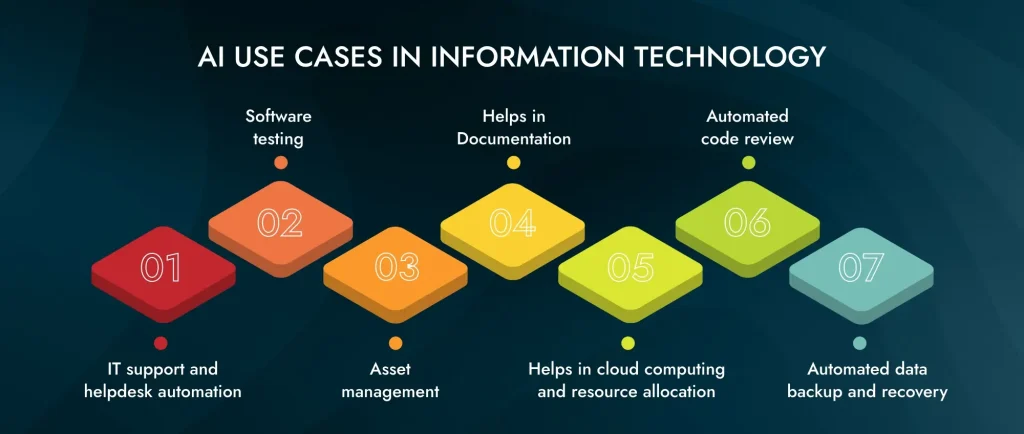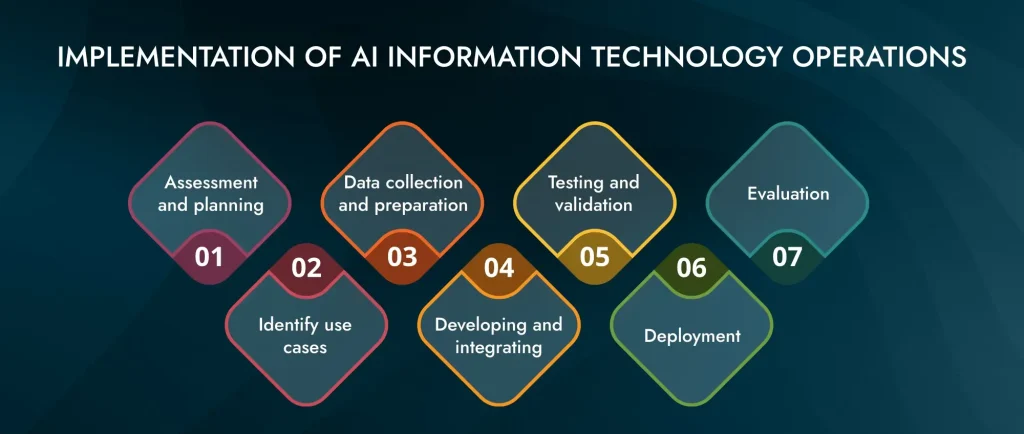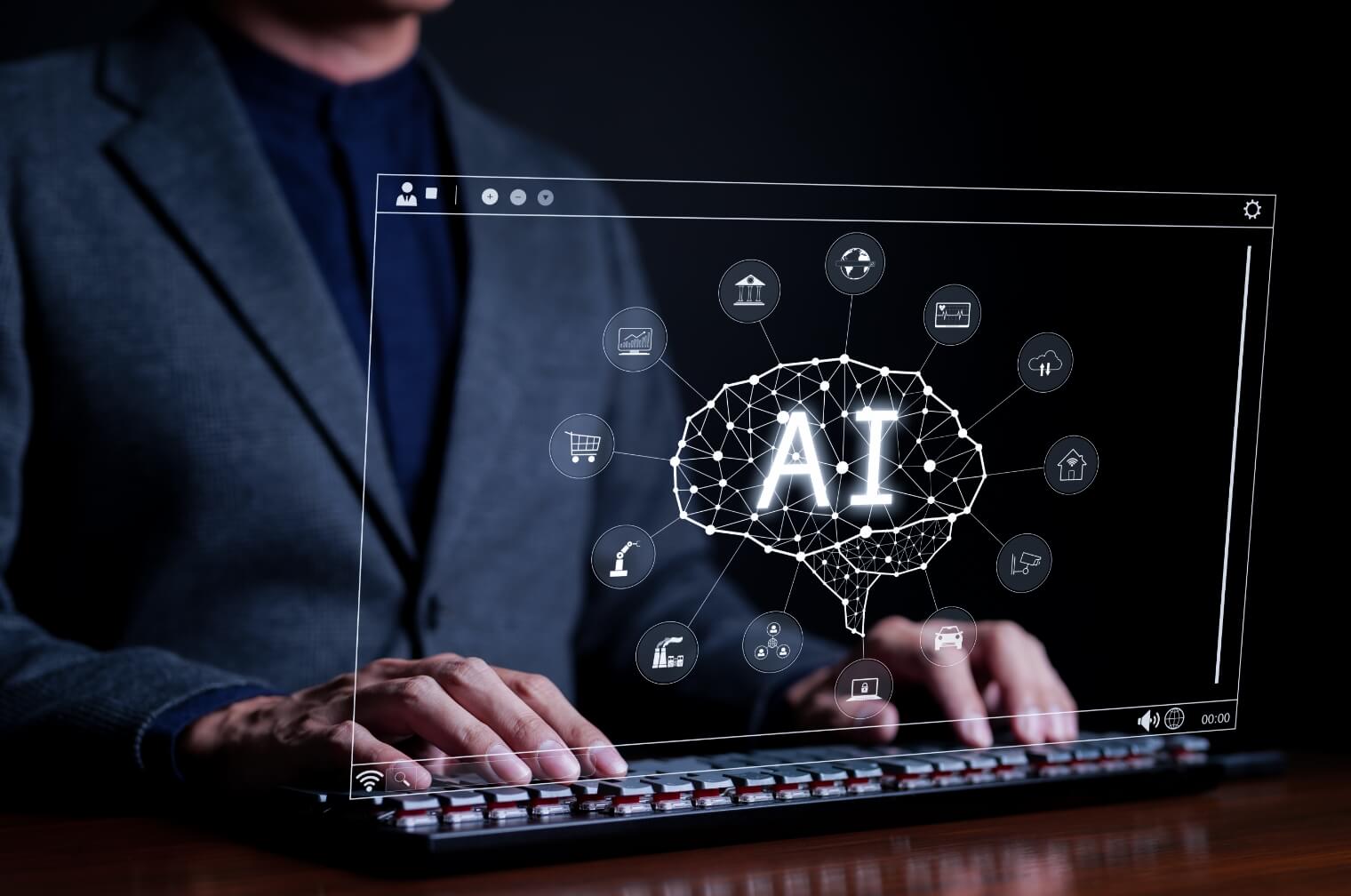In today’s rapidly developing landscape, businesses grapple with complex IT challenges—ranging from managing intricate operations to ensuring scalability and reliability. The integration of new technologies often adds to this complexity. But with ViitorCloud’s AI solutions, these hurdles become growth opportunities.
By implanting artificial intelligence into your IT operations, ViitorCloud empowers your business to tackle these challenges head-on. From real-time problem identification to predicting future issues and streamlining data management, our AI solutions optimize your IT infrastructure and operations systems, ensuring you stay ahead of the curve.
Curious about the AI use cases in information technology? Want to see how AI is revolutionizing IT operations? Let’s then dive into the details and understand everything. At ViitorCloud, we not only guide you through understanding AI in information technology but also deliver tailored AI development services that align with your business goals.
Why AI is Revolutionizing Information Technology & How ViitorCloud Can Help Your Business Thrive
AI in information technology isn’t just a trend—it’s a transformation. At ViitorCloud, we harness the power of AI to elevate your IT infrastructure, making it more efficient, strategic, and innovative. Our AI development services streamline repetitive tasks, freeing your team to focus on what matters most—driving your business forward. With our advanced AI solutions, we enhance operational processes, enabling your business to solve problems smarter and faster.
READ: Benefits of AI in Information Technology for Startups
Explore AI Use Cases in Information Technology with Us
AI Use Cases in Information Technology
According to the NextMSC, the global AI market will reach $207.9 billion in 2023. AI in information technology improves the IT industry’s operation, efficiency, and productivity.
Here are the AI use cases in information technology that enhance the IT business:

1. IT Support and Helpdesk Automation
IT support and helpdesk automation solve the issues and streamline the user interaction process. Employees who go through technical issues raise a support request through the chatbot. These automation systems categorize the issue based on its severity and nature. When a problem can be solved with automation, it is solved, and if it needs the help of a human, then a ticket is raised to the appropriate IT personnel to solve the issue.
As a result, efficiency improves in the IT department, and professional people can focus on complex tasks. IT support is one of the AI use cases in IT operations, which improves operations.
2. Software Testing
AI use cases in information technology play a vital role in software testing by automating and improving the testing process. It helps generate test cases, predict areas of code of instability, and adjust the testing strategies based on changing project requirements. This application advances the testing life cycles, ensures fast feedback to developers, and reduces the time to release software testing.
Additionally, AI identifies complex tasks and detects bugs and performance issues. Also, it automates repetitive tasks so the tester can focus on essential testing areas.
3. Asset Management
IT asset management involves tracking and managing assets in the entire lifecycle of IT, including hardware, software, and licenses. It also automates asset discovery, monitors patterns, and predicts when assets need maintenance or replacement. Additionally, AI helps IT professionals maintain necessary inventory and reduce the risk of unnecessary procurement, which saves costs. However, AI asset management ensures compliance with software license agreements and regulatory requirements.
4. Helps in Documentation
The combination of machine learning and natural language processing automates the documentation and classifies the document. As a result, organizing and searching for relevant information becomes accessible. Additionally, extracting critical insights from documents provides quick access to essential details. Moreover, AI chatbots and virtual assistance immediately answer customer and IT team queries from the documentation.
Additionally, the valuable feature of AI is that it provides update-based articles that analyze the latest trends, development needs in IT, and issues. These improve IT support efficiency, resolve issues faster, and reduce downtime. It is a way AI information technology use cases make the documentation process simple and effective.
5. Helps in Cloud Computing and Resource Allocation
According to Mordor Intelligence, the cloud AI market will expand from USD 51.04 billion in 2023 to USD 207.40 billion by 2028. AI analyzes the resource usage patterns, workload demands, and performance metrics to allocate CPU, memory, and storage resources as required. When resources match workload requirements, AI helps companies avoid oversupply and underutilization of resources, save costs, and improve the performance of the applications.
Additionally, AI identifies cost-saving opportunities to optimize storage uses in cloud environments. This application enhances the reliability, scalability, and cost-efficiency of cloud computing.
6. Automated Code Review
AI analyzes the software code, bugs, security vulnerabilities, and deviations from coding standards. This approach improves software development quality by addressing risks early in the process and creating a more secure, reliable, and maintained codebase. This tool provides feedback for improvement, expedites the software development lifecycle, and improves the efficiency of software engineering processes. It is one of the important information technology use cases in IT operations.
7. Automated Data Backup and Recovery
It is one of the AI information technology solutions that solves data backup and recovery problems. AI automates the scheduling and execution to ensure the timely and efficient creation of data backup and recovery and reduce the risk of human error. When there is a system failure or data loss, the automation recovery process of AI helps restore the information and minimizes downtime.
Additionally, companies can enhance the disaster recovery capability by automating important tasks, protecting essential data, and maintaining business continuity. It is one of the important information technology use cases in the IT business.
ALSO READ: Top 5 Applications of AI in Information Technology
Discover How AI Transforms IT—Let’s Innovate Together for Your Business
How do we implement AI information technology operations?
When implementing AI in the IT industry, IT operations become effective. This AI innovation ensures proactive management and frees resources for strategic initiatives.
Let’s understand the process of implementing AI use cases in IT operations:

Clearly defining the objective of the business helps implement AI in IT operations. The objectives include improving efficiency, providing security, or optimizing the allocation of resources. Also, evaluating the current IT infrastructure, such as existing technologies, team skill sets, and data quality, is essential to identify the readiness for AI integration.
It is necessary to identify use cases such as automated monitoring, predictive maintenance, or detection of security threats. When use cases are identified, IT teams can solve the specific problem in the business and help assess the feasibility of implementing AI. Additionally, identifying use cases helps identify challenges and risks for AI implementation. The risks include data privacy, regular compliance, security, and ethical considerations.
Data collection is important for businesses to analyze. The data includes historical data, performance metrics, and other data sources. Also, quality and reliable data are essential for the company to analyze.
Collaborate with data scientists and IT professionals to develop and train AI models. Also, AI should be integrated with existing systems to improve workflow, ensure compatibility, and minimize distribution for ongoing operations.
Once the AI model is developed, it is essential to test and validate it. For the testing, create a controlled environment where AI models can be tested. Feedback will also be received based on testing. Performance analysis is possible during the testing phase, and improvement will occur in the AI model.
Once the AI model in IT is tested and validated, implement it on a smaller scale or in a specific department without expanding into a broader operation. After implementing it on a smaller scale, monitor the tools to track the performance of systems and provide support for the operations.
The last is to evaluate the AI model. In this step, the performance of AI models is assessed regularly with the defined objectives and key performance indicators ( KPI). After evaluation, improve and optimize the system based on performance feedback and operation changes as per requirements.
These are 7 steps to implementing AI information technology use cases in the IT industry.
SEE: Cost Optimization in IT with Artificial Intelligence
Harness AI Use Cases in Information Technology to Elevate Your Business
How Can Viitorcloud Help IT Industries with AI?
In the developing IT sector, staying ahead of the curve requires more than just adapting to changes—it means leading the charge with innovative solutions. That’s where ViitorCloud comes in, offering tailored AI solutions designed to elevate your IT business to new heights.
From automating routine tasks to enhancing software testing and optimizing IT support, AI transforms the way businesses operate. But beyond the technical advantages, the real power of AI lies in its ability to empower decision-makers, streamline operations, and drive growth.
At ViitorCloud, we don’t just provide AI development services—we partner with you to unlock the full potential of AI use cases in information technology. Our team of AI experts listens to your unique challenges, understands your vision, and crafts bespoke AI strategies that align with your business goals. We’re not just here to implement AI; we’re here to transform your business, making it more efficient, more competitive, and more successful.
When you’re ready to take your IT business to the next level, ViitorCloud is ready to make it happen. With our expertise and commitment to excellence, you can trust us to deliver AI solutions that work for you. So don’t wait—reach out to ViitorCloud today, and let’s start building the future of your IT business together.
Frequently Asked Questions
The impact of AI on information technology is to streamline the IT operation process, enhance decision-making, and improve efficiency in data management. Also, it helps to reshape the future of the IT industry.
AI used in information technology are automating technical tasks, assisting in IT management, and helping in IT documentation. Additionally, AI helps in software testing, automated code review, data backup and recovery, cloud computing, and resource allocations.
AI is an example of natural language processing used in information technology as it helps interact with the customers, provides customer support, and automates the responses. It enhances the user experience and improves efficiency in real time.

Vishal Patel
Vishal Patel is an experienced Solution Consultant with a proven track record in the information technology and services industry.
